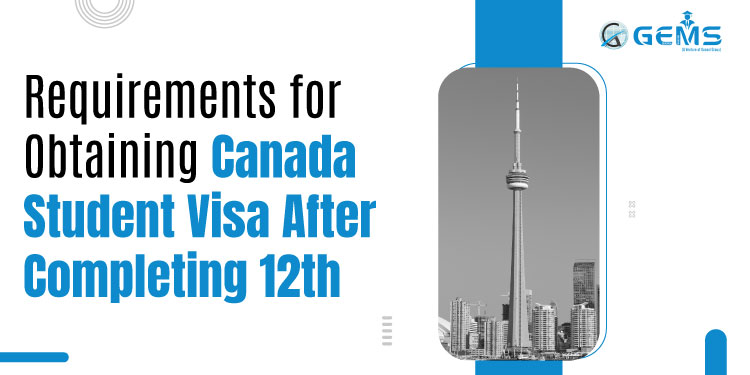Completing your 12th grade is a significant milestone, and as you stand at the crossroads of higher education, Canada beckons as a promising destination. Renowned for its world-class education system and diverse cultural experiences, Canada has become a top choice for students globally. However, before you embark on this transformative journey, understanding the requirements for obtaining a Canada student visa is crucial. In this blog post, we will delve into the essential prerequisites that will pave the way for your academic aspirations in the Great White North.
Educational Eligibility:
Acceptance into a Designated Learning Institution (DLI):
The first step towards securing a Canada student visa is obtaining acceptance into a Designated Learning Institution (DLI). Canadian immigration authorities recognize certain institutions as meeting specific quality standards. Ensuring that your chosen institution is on this list is fundamental to the visa application process.
Proof of Admission:
Once accepted into a DLI, you will receive a letter of acceptance from the institution. This document is not only a testament to your admission but is also a key requirement for your visa application. Keep this letter securely as you proceed with the visa process.
Financial Proof:
Proof of Funds:
Demonstrating your ability to cover the costs of tuition, living expenses, and return transportation is a crucial aspect of the visa application. Canadian immigration authorities typically require proof of funds for a specified duration. This can include bank statements, sponsor letters, or any other evidence that showcases your financial stability.
Tuition Fees Payment:
Alongside proof of funds, evidence of payment of your tuition fees is essential. This reinforces your commitment to pursuing your studies and ensures that you have taken the necessary steps to secure your place at the educational institution.
Immigration Documents:
Valid Passport:
A valid passport is a fundamental requirement for any international travel, and obtaining a Canada student visa is no exception. Ensure that your passport is valid for the entirety of your intended stay in Canada.
Passport-sized Photographs:
Prepare a set of recent passport-sized photographs that adhere to the specifications outlined by the Canadian immigration authorities. These photographs will be required for various stages of the application process.
Language Proficiency:
Language Proficiency Test Results:
Proficiency in English or French is often a prerequisite for studying in Canada. Depending on the language of instruction at your chosen institution, you may need to provide the results of language proficiency tests such as IELTS or TOEFL. Meeting the minimum language requirements is vital for visa approval.
Health and Security:
Medical Examination:
Undergoing a medical examination is mandatory for Canada student visa applicants. Designated Panel Physicians approved by the Canadian government must conduct these examinations. The results are submitted along with your visa application to ensure that you meet the health standards set by Canadian authorities.
Police Clearance Certificate:
A police clearance certificate is required to verify that you have a clean criminal record. This certificate is typically obtained from the police or relevant law enforcement agencies in your home country. It serves as assurance to Canadian authorities regarding your background.
Understanding the Study Permit:
Study Permit Application:
The key document that allows you to study in Canada is the study permit. This permit is issued by Canadian immigration authorities and is separate from the visa. Ensure that you understand the distinction between the study permit and the visa and that you apply for both, if necessary.
Application Submission:
Submitting a comprehensive and accurate visa application is crucial. Ensure that all required documents, including the letter of acceptance, proof of funds, and language proficiency results, are included. Any discrepancies or incomplete information may result in delays or denial of your application.
The Importance of Planning Ahead:
Timeline Considerations:
Initiating the visa application process well in advance is advisable. Processing times can vary, and submitting your application early allows for any unforeseen delays. Planning ahead also provides you with ample time to address any additional requirements that may arise during the process.
Understanding Post-Graduation Work Permits:
If your academic journey includes plans for post-graduation work in Canada, familiarize yourself with the requirements for obtaining a Post-Graduation Work Permit (PGWP). Understanding the eligibility criteria and application process for the PGWP ensures a smooth transition from student to professional in Canada.
Seeking Guidance:
Consulting Immigration Experts:
Navigating the intricacies of the Canadian visa application process can be daunting. Seeking guidance from reputable immigration consultants or experts can provide invaluable assistance. They can help ensure that your application is comprehensive, accurate, and stands the best chance of approval.
Stay Informed:
Keep abreast of any changes or updates to the visa application process. Immigration policies can evolve, and staying informed ensures that you are well-prepared and can adapt to any new requirements.
Conclusion:
Embarking on a journey to pursue higher education in Canada is a transformative experience. Understanding and fulfilling the requirements for obtaining a Canada student visa after completing your 12th grade is a crucial step in realizing this dream. By meticulously adhering to these prerequisites, you set the stage for a seamless transition into the Canadian academic landscape, unlocking a world of opportunities for personal and professional growth. As you prepare to step onto Canadian soil, may your educational journey be enriched by the diversity and excellence that characterize this esteemed destination.



